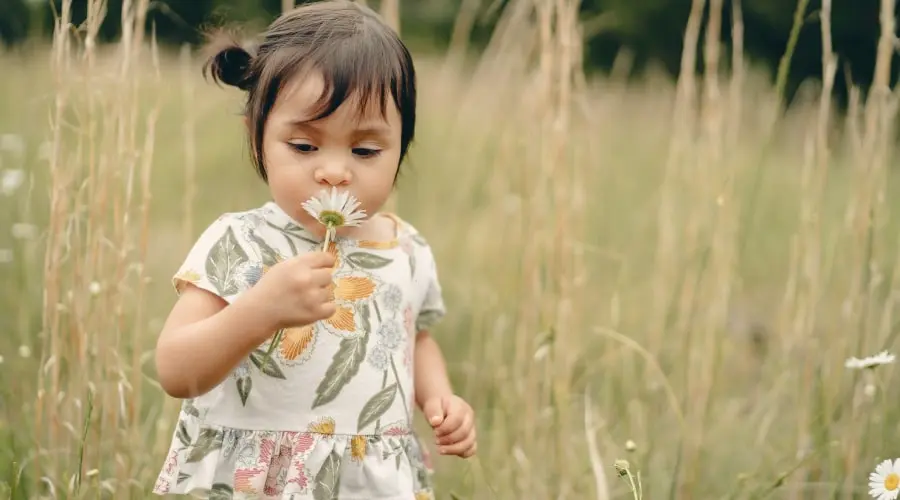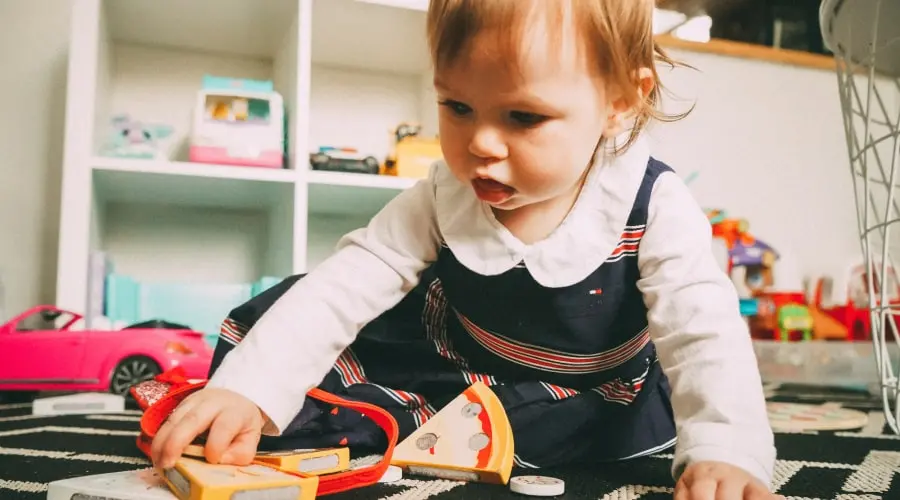settings
children
With Famly since
Be honest, how often do you really think about different smells? Maybe your favourite shampoo smells like coconut, or the bubblegum your little one keeps begging for smells overwhelmingly...pink.
Smell is incredibly important when we’re talking about child development, but it’s so second nature to us that we might not think about what it’s like for our youngest. When you walk into your setting, what does it smell like? Do your staff wear a lot of perfume? What does the soap in the bathroom smell like?
We’ve written about the importance of colour, of hectic displays and of more natural environments. But let’s take a deep dive into why doing an audit of how and when you use smell shouldn’t be overlooked. From assessing your nappy disposal right down to your washing powder, being aware of smells for little noses, and adult ones, goes a long way.

Why smell matters
From the minute they’re born, babies have quite a strong sense of smell. That’s exactly why babies recognise who their mother is - they recognise how they smell, and the scent of their breast milk.
Our sight isn’t as developed, so babies actually recognise people and places by their smell instead of how they appear visually. Those little noses play a huge role in helping children understand the world around them, and recognising their caregivers.
And the magic doesn’t stop there. When the brain processes smells, it sends them through parts of the brain that handle emotion and memory - which means smells are interlinked with how we feel and what we remember. That’s why the perfume your grandmother used to wear will probably give you an immediate memory if you were to smell it again.
When we think about getting young children to try new foods, smell is a big part of that, as if they don’t like how it smells they’re probably not going to want to take a bite.
Long story short; smell really matters! But sometimes we might forget that the way an Early Years environment smells also matters. Which is exactly why doing a stinky audit is worth thinking about.

A smelly environment
It’s hard to be constantly aware of how the environment around you smells, especially if you’re juggling one child who’s crying because they grazed their knee, another who needs their nappy changed, all while trying to concentrate with an eruption of noise all around you. Smell might be the last thing on your mind.
But the smells in your environment can actually affect:
- Children’s moods (and yours, too!) A recent 2016 study found that fragrances had an impact on the way we feel - from drowsiness and alertness to feeling relaxed. The products you’re using to clean might actually be making the children more hyperactive than they need to be, or you more stressed than you normally are.
- Learning and development. Recent studies have shown that when you’re exposed to a certain smell while learning, you’ll find it easier to remember the information if you smell the aroma again. Obviously we’re not grilling our youngest to recount vocabulary, but smell has a strong link to learning and remembering.
- Your occupancy. How does your setting smell when you first walk in? If you were a parent, would you be more likely to choose a setting that has a strong odour of nappies and day-old food, or one that smells fresh and clean? Smell has a massive impact on marketing, and if a parent will choose to send their little one to your setting.
The big ideas

The very first steps
We’ll go into some tips on managing the pleasant and not-so-pleasant smells of your setting below, but before you think about shaking up your routine and making any changes, let’s look at the very first steps before you get to the stinky audit:
- Ask the parents. Parents come in at the beginning of the day, and at the very end, making them the perfect people to ask. When you’re in an environment all day, you may not be aware of any strong perfumes, or what it smells like when you initially walk in. Or the smells the little ones bring home with them!
- Ask the children. Have you ever asked the children if they liked the smell of the washing up liquid? Or if the baby powder you use? Asking them goes a long way when you’re assessing what smells stay and what smells go. Do they hate going into the hall because it smells of cabbage all the time? Or dread going into the garden because they really dislike the strong hyacinth bush?
- Ask your staff. Getting your staff’s opinion is absolutely key. Do they notice any changes in the children’s moods when you change the washing powder? Do they notice any changes if they’re wearing a strong perfume? Maybe the children are more cuddly, or shy away from cuddles when they wouldn’t normally.
A note on smell sensitivity
It’s worth noting that while smells play a big part in mood, enjoyment, parent assessment and a lot more, we should be mindful of any children in our care that might have a sensitivity towards smell.
Children who are on the autism spectrum, for example, can have a heightened sensitivity or different experience towards odours. They might smell things more strongly, or have a very strong reaction to smells where other children might not. What might be a slight annoyance to non-sensitive nostrils might be quite distressing for them.
You know your children best, and will be able to judge their behaviour and reasons for it, but smell might not have necessarily crossed your mind. If you do have children on the autistic spectrum in your care, or any children with Sensory Processing Disorder, it may be worth doing a little stinky audit just for them. Try removing heavily scented products as a first step, and adjust and improve as you go along.
What to look out for during a stinky audit
By simply being mindful when you purchase new washing powder, berry-flavoured squash or rhubarb-scented anti-bacterial spray, your smell audit will just become part of your routine. So what should you be mindful of when you’re thinking about doing your first ‘stinky audit’? We’ve got a few tips to start you off:
- Smelly shoes: When parents, children and staff walk into your setting, the first thing a lot might see and experience is the cloakroom. If there are dozens of pairs of shoes, it may get a bit whiffy. Can you do some organising to place them in boxes? Baskets? Outside in a dry area? Tucked away but still accessible for outdoor time? Those first moments when you walk through the setting doors are so crucial, so having a look at your cloakroom scents is a perfect place to start.
- Cleaning materials: Think about if these have a very strong smell. As much as you might love a pine-fresh antibacterial spray, it doesn't have to smell 'nice' to be clean.Try switching to natural/neutral ones that are fragrance-free. They'll get the same job done without overpowering scents hanging in the air.
- Washing detergents: What matters to you most is getting everything clean, as no-one wants a washing machine overflowing with dirty nappies and rompers. But are you using a strong powder? Are you positive that it isn’t causing any allergies or reactions? The clothes are sitting right next to the children's skin, so those scents will be very close to little noses.
- Hygiene products: From hand cream and perfume to the lotion you use on nappy rash, smell is everywhere. If children are giving you a big hug, your perfume might rub off on them, and they might not even be able to verbalise that it's bothering them. Some children might love your lavender scent, parents might have commented that their child comes home smelling of vanilla and they think it's irritating their child's throat. Ask them, ask your staff, and ask the little ones.
- Nappy stations: Nappies are an unavoidable part of setting life, and sometimes the smell just hangs in the air. Think about where you usually store dirty nappies, wipes and cloths. If the nappies are disposable, do you have a sealed bin in an area out of the way? If they’re cloth nappies, do you have a system to keep the smell to a minimum between washes? By making a few changes you can really drive those odours down to a minimum.
- Bin bags: We can't do much about the way waste smells, but we can make sure bin bags are closed when they can be. Do you use a bin with an open top? What kind of liners do you use? Plastic actually absorbs odour more than metal does, so think about switching to metal if you feel like the smells just aren't going away.
- Choosing your scents wisely. There are lots of natural scents that can make a little difference. Instead of using an air freshener with a lot of heavy, overpowering scents, natural scents might be a good alternative. Pure essential oils keep their smell well when dripped onto wood or wooden blocks, for example. You should of course always perform a risk assessment before using essential oils, however, as some can be dangerous. If you are considering natural scents like essential oils, it's best to read up on which ones are safe to use.
- Fresh air: It may go without saying, but fresh air goes a long way in getting some of those stinky smells out. You won’t be able to keep the window open in subzero temperatures of course, but getting a bit of air circulation now and then works wonders.
Top tips from Alphabet House
Get top tips from a setting just like yours. Hear from Alphabet House on why and how they use Famly - and why they’ve never looked back.
Read their story










